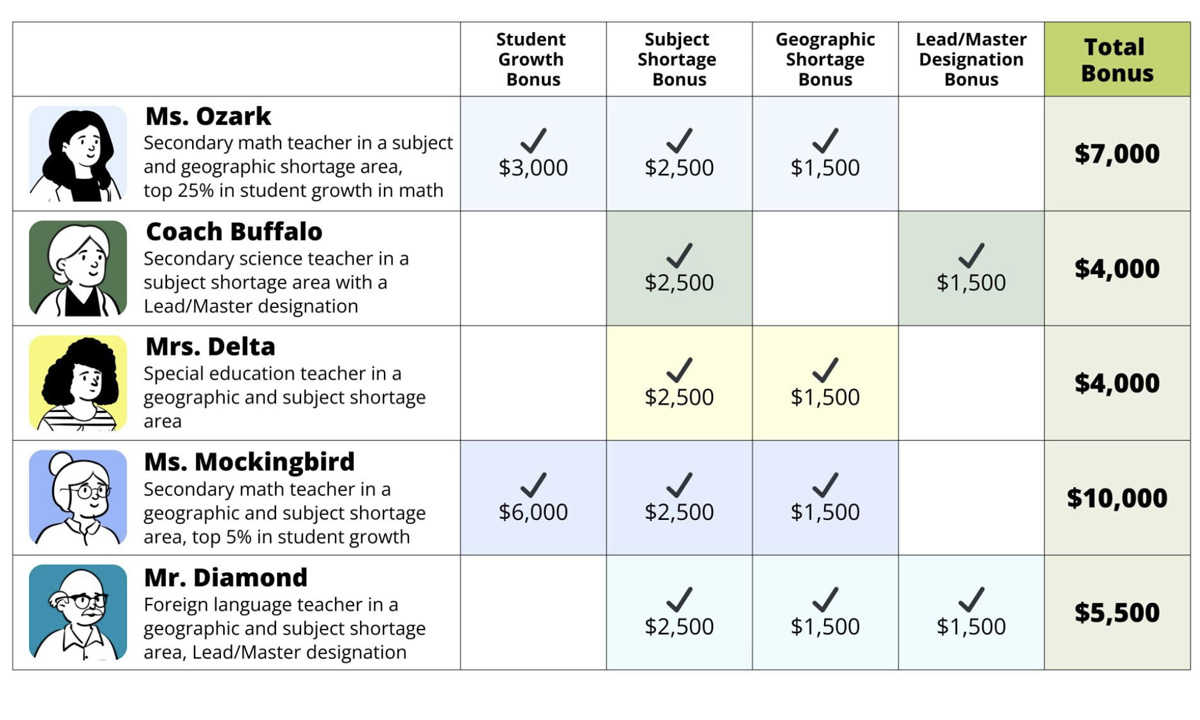4,200 Arkansas Teachers Will Get Up to $10K for High Performance, Student Scores
State-funded merit pay program is in its second year, but teachers union says it's unfair to certain hardworking educators who can't qualify.

Get stories like this delivered straight to your inbox. Sign up for The 74 Newsletter
Thousands of Arkansas educators will open their mailboxes this summer to find checks of $1,500 to $10,000 as a reward for high student performance and improved outcomes during the 2024-25 school year.
Gov. Sarah Huckabee Sanders and the Arkansas Department of Education announced Tuesday that 4,200 educators qualified for bonuses under the Learns Merit Teacher Incentive Fund Program, which launched in 2023 as part of a major education reform bill. Roughly 3,000 educators received checks during the program’s first year.
“It’s neat to see how surprised [teachers] are, because they think that everybody’s working just as hard as they are, and that all the students are learning as much as their students,” said Jacob Oliva, Arkansas’ secretary of education. “It’s a special moment to really celebrate some of the best of the best.”
This year’s $14 million in bonus pay from the state is meant to incentivize, recruit and retain high-performing educators while reducing staff shortages, according to the department. But the state’s largest teachers union says too many educators are left out of the running for the annual salary boost.
To be eligible, educators have to meet a complex list of requirements, including having three years of experience and either spending 70% of their time in the classroom or working as a librarian or school counselor.
Classroom teachers have to demonstrate growth in their students’ state test results and be ranked as effective or higher in the Arkansas Teacher Excellence and Support System, based on district evaluations of factors like quality of instruction, classroom environment and student engagement.
Educators who don’t have student state assessment data — such as those specializing in subjects not tested, like fine arts — have to be rated highly effective.
Finally, qualifying teachers must rank in the top 25% of student growth scores, based on a three-year average of English language arts, math or science state tests; teach in a critical shortage area; or mentor college students to become teachers.
Bonus amounts depend on which criteria educators meet. A teacher can receive $9,000 for ranking in the top 1% in student growth, while a counselor could receive $1,500 for working in a geographic shortage area. Bonuses can reach $10,000.
But April Reisma, president of the Arkansas Education Association, said many high-performing teachers are left out.
“I’m a special education teacher. One time in my life I’ve had a student that hit ‘exceeding’ on that test,” she said. “I’ve been a great teacher, and I’ve consistently got [highly effective] on my test evaluations, but I may or may not get that bonus, depending on whether or not my kids had a great day. It’s all based on a test at the end of the year for that growth. The results of one test are not an accurate indicator of how a student is performing.”
The legislation that created the merit pay program also eliminated bonuses for national board certified teachers, a recognition that educators can receive after meeting rigorous standards. Reisma said certified teachers used to receive annual bonuses of $10,000, but those dwindled to $2,500 by the end of last year.
Lawmakers and state officials have said the bonus program’s many qualifications were intended to reward, retain and recruit educators who have a significant impact, such as producing outstanding student growth, teaching in short-staffed schools and mentoring future teachers.
“The program is designed to target those specific things, and from my perspective, has done a good job of providing significant additional compensation in those areas, and is likely to improve recruitment and retention across all three of those areas,” said Josh McGee, a professor with the University of Arkansas Office for Education Policy. The university is partnering with the state to implement the program.
The effectiveness of performance-based pay has varied over the years, with earlier programs lacking in impact and more recent attempts producing positive results.
While Arkansas’ program is state-funded, the federal government has awarded merit pay grants to school districts for nearly two decades. Texas, South Carolina, Tennessee and Washington, D.C., have implemented performance pay programs over the years with mixed results.
Federal funding for teacher incentives was eliminated this spring with the Trump administration’s efforts to scrap diversity, equity and inclusion initiatives.
The university will conduct research on the Arkansas program’s effectiveness in the coming years. McGee said an initial analysis will most likely take place in the fall, but an overall study won’t happen for a few years.
Get stories like these delivered straight to your inbox. Sign up for The 74 Newsletter

;)
